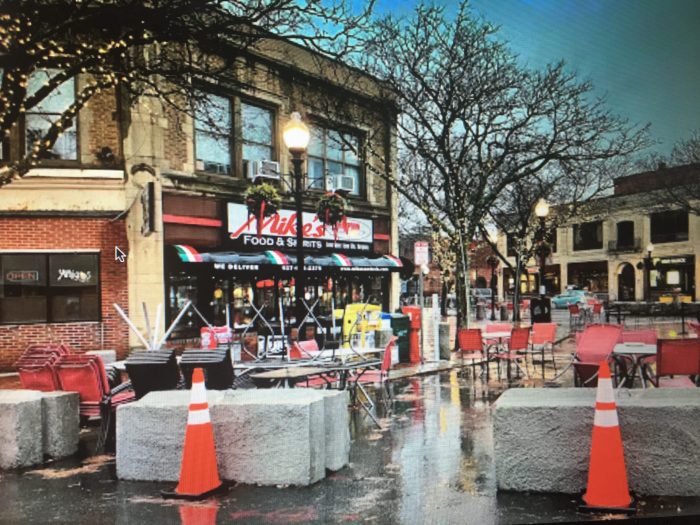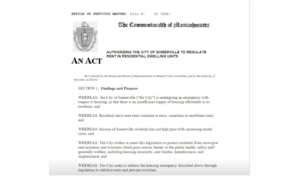Business owners question why Somerville has stayed so cautious.
(Somerville Wire) – On March 1, the Baker-Polito administration announced that Massachusetts will be advancing to Phase 3, Step 2 of its reopening plan. In a controversial decision, the city of Somerville chose to remain a step behind, continuing to stay in Phase 3, Step 1. While officials and advisors defend this course of action as a careful, wary approach, many small business owners who have struggled through the pandemic have been left to ask, why is Somerville choosing to differentiate itself from the rest of the Commonwealth?
According to the state’s plan, a number of industries will be able to operate at a 50% capacity limit, including museums, libraries, and indoor recreation spaces. Restaurants will be required to keep tables six feet apart, but they will not need to adhere to a percent seated capacity limit. In Somerville, the City will be holding up a stricter standard. While some businesses will remain open, such as gyms and martial arts facilities, capacity limits for many, such as restaurants will stay at 25%. In a statement, Director of Health and Human Services Doug Kress explained that he believes prudence in the face of the pandemic is wise.
“Both the state and Somerville data dashboards show that COVID-19 cases have declined since the peak during the most recent surge; however, they remain at levels significantly higher than the summer and fall before that surge began,” wrote Kress. “Meanwhile, the CDC is pleading with states and cities not to relax restrictions too quickly and risk squandering the progress we all have made during this pandemic.” He added, “In Somerville, we are seeking more than short-term, unstable relief from the closures. We are striving to protect lives and health and to reopen responsibly so we have our best shot at vanquishing this disease for good, and not just until the next surge.”
Amy Bantham is a consultant with Somerville’s Health and Human Services department, and she also serves as Somerville’s contact tracing and testing lead. She said that given the vaccines versus variants race, where variants are winning, a cautious approach is warranted. Somerville is currently seeing a plateau in cases, indicating that now is “not the time to declare victory.” According to data from the state, Somerville’s 14-day average daily incidence rate, 21.3, is comparable to other cities nearby, with Boston’s being 24.3, Everett’s being 29.9, and Medford’s being 17.2. In spite of these similarities to nearby communities, Bantham said that Somerville is heeding the advice that national public health experts have given and using Somerville-specific data from contact tracing.
“Somerville isn’t an island, and COVID knows no boundaries,” said Bantham. “It’s best to have communities walking in lockstep. The question I would ask is, why is the Commonwealth lifting restrictions right now? Our national public health experts, including Dr. Fauci, have urged us to be patient.” She added, “We’re in this vaccine versus variants race, and we’re trying to get vaccines in people’s arms before variants. We are seeing worrisome data about variants prevalence out of NYC. We don’t want to go the route of Italy, for example, that had to reinstitute a significant lockdown, like the type that they hadn’t seen since the early days of the pandemic. Now is really a time for patience.”
Many people in the business community have expressed that they can wait no longer, that the City’s call for a slow reopening has come with the sacrifice of their livelihoods. Bob Luz, president and CEO of the Massachusetts Restaurant Association, drafted a letter that addressed the urgency small businesses and restaurants in Somerville are feeling, calling for Mayor Joe Curtatone to ease the restrictions and increase capacity limits. He wrote that he has observed restaurateurs following protocols, resulting in “over 21,000 inspections with a 98.4% full compliance rating, and less than .5% contact tracing results.”
“One city out of 351 in the state of Massachusetts does not have access to differential data, nor does one mayor have any more knowledge in regards to the fact based strategy for safely re-opening businesses than the Commonwealth of Massachusetts,” wrote Luz. “With this said, this unfortunate distinction led by Mayor Joe Curtatone seems to be solely based on political vanity and is at the expense of the business community and its hard-working citizens. The Massachusetts Restaurant Association publicly and formally demands that Mayor Joe Curtatone immediately lifts all capacity limits on businesses in compliance with the Commonwealth of Massachusetts.”
Joe Cassinelli, CEO of Alpine Restaurant Group, said that he thinks the decision to remain in Phase 3, Step 1 is “very unfair.” Because the capacity limits are so low, it is not efficient for him to keep restaurants like Rosebud American Kitchen & Bar and The Painted Burro open right now. Surviving on takeout alone is not enough of a business plan, and it is still too cold to use the outdoor patios. Cassinelli said that he feels as though the business community is being manipulated to advance a political statement.
“There’s just been an overall lack of communication, a lack of leadership,” said Cassinelli. “I feel like we’re being played with and we’re being used in some kind of political statement. He [Curtatone] has made it very clear he doesn’t agree with Charlie Baker and the administration on reopening.” He added, “If he’s holding this line, it just feels like he’s playing politics with us.”
Maria Terranova DiSisto, owner of Mike’s Food and Spirits, in the heart of Davis Square, also expressed her frustration with the policy. She pointed out that Somerville is surrounded by Cambridge, Arlington, Medford, and other cities, all of which have moved ahead with their reopening plans. She said that restaurateurs in Somerville are only asking for “an equal playing field” with surrounding communities and that if half the other towns were remaining in Phase 3, Step 1, Somerville’s decision would seem more understandable.
“I don’t necessarily understand the logic or the reasoning, because I think it would be safe to assume that the city of Somerville does not hold or have access to any data that is different than the 350 cities and towns in the state,” said DiSisto. “We’re all looking at the same data and statistics. To single out Somerville and say we’re going to hold your business community hostage and not move forward—I think people need to start asking what the bigger picture is. I certainly don’t think it’s COVID.” She added, “We’re simply asking to be able to open up the same way that every other surrounding community in the state is opening up.”
All Somerville Wire articles may be republished by community news outlets free of charge with permission and by larger commercial news outlets for a fee. Republication requests and all other inquiries should be directed to somervillewire@binjonline.org.
Shira Laucharoen is assistant director of the Boston Institute for Nonprofit Journalism and assistant editor and staff reporter of the Somerville Wire.
Mary Ellen Myhr has been a Somerville resident since 1997 and is the president of the Boston Institute for Nonprofit Journalism’s board. She writes for the Somerville Wire.





